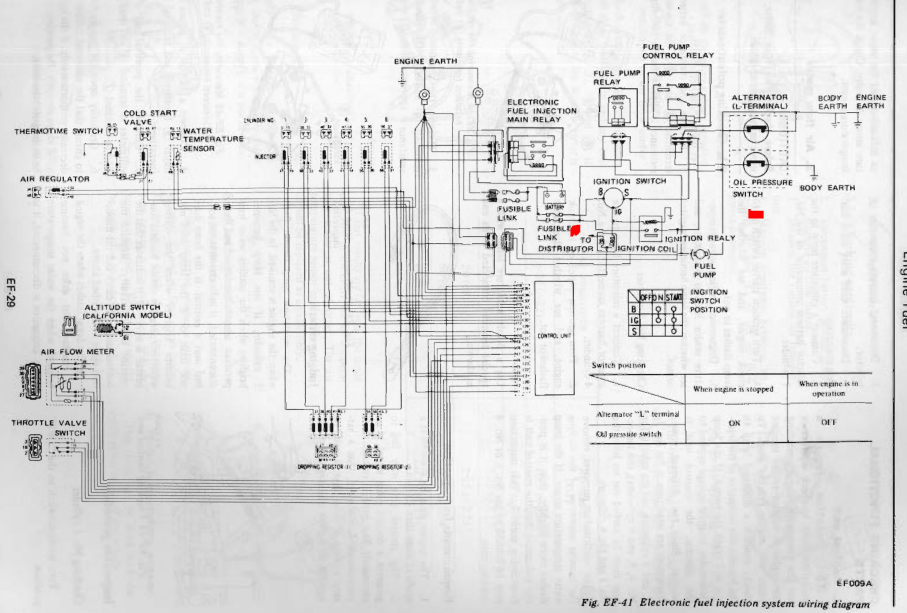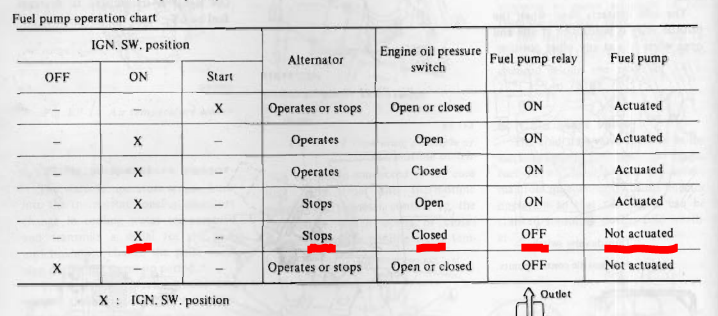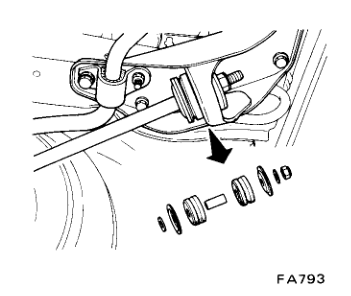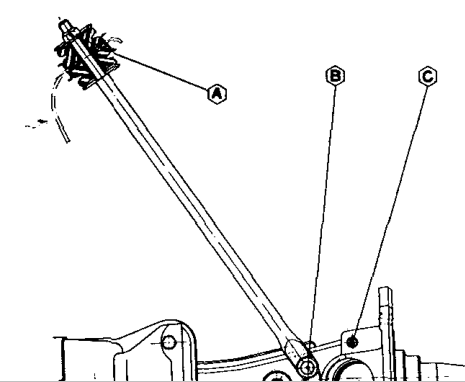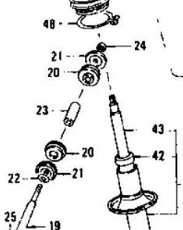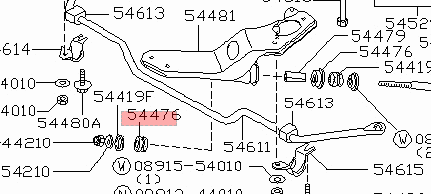Everything posted by Zed Head
-
Head Gasket leak?
Any chance there's something off with clamping force? Bad bolts, bad threads, funky torque wrench. Are the fire rings crushed flat, like they should be? You're putting a lot of faith in that "chem test". Test products don't sell well unless they show results.
-
Car stalled in driveway and now no power to fuel pump
Measure voltage with the key on, on both sides of the links. Follow the power path. If the relays don't click it means they're not getting power.
-
Car stalled in driveway and now no power to fuel pump
It's described in great detail in the link at the bottom of site's post from atlanticz. http://atlanticz.ca/zclub/techtips/fuelpump/moreinfo.htm
-
Car stalled in driveway and now no power to fuel pump
I just posted this trick in another post. Disconnect the oil pressure switch and turn the key to Start. That should cause the pump to get power. If it does or doesn't, both will be clues. You might have a bad switch so reseating the plug won't help. Make sure that the wires to the switch aren't shorted to ground either. That would be like having the switch closed. Also, check your fusible links.
-
contact cleaning?
It's all described in the FSM, Engine Fuel chapter. BUT, I just remembered the one situation where the pump will run with the key at On in the 1978 model. If the oil pressure switch is disconnected. That creates the "Open" condition shown in the table. It's a flaw in the design, but many 78 owners use it as a trick to turn their pump on.. So you either have the wrong oil pressure sender or yours is broken, if that's the cause for the pump running. Anyway, it still sounds like your rail is leaking down, whatever the reason. I think that the CSV portion of the rail might not refill as fast as the rail itself, because it's on a branch. drive your car, park it, the pressure drops and the CSV dries out because it's hot. Turn the key on, the pump runs and you get pressure, but there's a bubble at the end of the CSV line. So, basically like having no CSV. Get your pressure to hold overnight and it will probably start normally.
-
contact cleaning?
The other three happen when the engine is running. Either oil pressure or alternator current need to be present. It is a confusing chart, because Nissan doesn't really describe that oil pressure causes the switch to open.
-
contact cleaning?
No, I'm saying that it's not working correctly. It might be shutting power off when you turn the key to Start. I'm saying it's screwed up and wrong. Edit - to be blunt and clear...(smiley face here).
-
contact cleaning?
- contact cleaning?
Because it's doing something it's not supposed to be doing, even if it seems like a good thing. 1978 cars did not come with the priming function. It's not working correctly, therefore it might have other problems too.- contact cleaning?
"Primes" usually means that it activates for a few seconds then turns off. Kind of sounding like you might have some fuel pump relay problems. The pump should not get any power until you turn the key to Start or the engine is running. Relay testing is shown in the FSM.- We're bringin' back the Flat Tops!
- We're bringin' back the Flat Tops!
Does anybody have the micofiche CD? Might have more drawings.- We're bringin' back the Flat Tops!
- contact cleaning?
Are you positive that this is real? Seems odd. Still not clear how exactly you blocked off the supply and return lines to the fuel rail. Your problem really sounds like either an FPR that leaks down quickly or a bad check valve in the fuel pump. Pretty common and slow starts in the morning are the symptom. If you didn't get a good seal on your supply and return lines they could still be leaking. In short, sounds like a fuel pressure leak-down problem.- contact cleaning?
Did you block the CSV? Not really clear what "both hoses" means either. Also, not clear what the problem is. You mentioned a labored start, and a start up time/stutter, and a lower fast idle, but what would you like to be better? You probably mentioned it in another thread, it seems like you've described it before. Can't remember what car you have either. I think that, generally, raw fuel in the intake manifold or cylinders will cause the engine to start up faster. That's what the CSV is for, to squirt a load of raw fuel in to the manifold. Might be that you have a weak spark problem instead. Not sure. Anyway, give fresh description of the problem and something might show.- Fuel pump issues!
Start at the battery, then the fusible links, and onward...- Fuel pump issues!
That must mean something. At least it gives hope that the pump is good. Get used to poking around with your meter and working from the wiring diagram.- Fuel pump issues!
What does "tried" mean? Have you verified that you have a good ground at the pump? You need power and ground to get current to flow through the pump, to make it spin. Sometimes a tap on the pump body will get it spinning if it has power and ground. Might help to put a list together and check things off as you test them. You're kind of jumping around from thing to thing. Being methodical is important for working on these old cars.- Fuel pump issues!
The noise in the video just sounded like the starter re-engaging when the engine fired once. Pretty common when having starting problems. You're not really following a good plan. To test your pump, pull the yellow wire from the starter and turn the key to Start. You should hear the pump run. If you have a gauge connected you should see the needle move. If you want to leave the pump running, turn the key on, and move the AFM weight. Ideally you would actually get a fuel pressure number. With a $30 eBay pump it's possible that you won't get full pressure or that the pump will overheat quickly. Who knows. Letting the pump run with a gauge connected will answer that question. It will also tell you if your hoses are connected correctly. Testing the engine with starter fluid is pretty simple, but if you want to save a few dollars, just pour some gasoline directly in to the intake manifold through one of the vacuum ports. It's dangerous, of course, but it's the same method carb guys use, except they pour it through the carb throats. You can also use carb cleaner through a vacuum port.- Head Gasket leak?
Maybe you had residual combustion byproducts in the block. Or maybe you just have a small leak that shows on the test, but is not the cause of the gushing. You're trying to assign two separate results to the same cause. Might not be the case.- Fuel pump issues!
Check that the other wire, the one that does not have 12 volts, has a good ground. No ground, no spin.- Head Gasket leak?
That's some good diagnostic work there. Magnaflux is the typical crack test method, I believe. Looks like they've expanded their methods. Might give you some ideas. https://www.magnaflux.com/Magnaflux I wonder how your engine would have run as a daily driver? Pretty sure I've sen threads about gushing coolant and much discussion about "burping" the engines. Maybe they just had cracked heads. Ouch.- Head Gasket leak?
Cylinder pressure pushing gases into the coolant channels would be much higher than coolant pressure the other way. Plus gases are less viscous than water. Interesting problem. Good to have two engines to compare. Here's a thread with some chopped up heads that might show you where a crack or erosion could cause problems. https://forums.hybridz.org/topic/59029-head-cooling-on-cylinder-5-solutions/page/2/- Do NOT buy a 123ignition distributor.
Actually, that guy is showing that somebody didn't install the rotor correctly. It wasn't pressed down far enough and seated. That's a "user error" video, unless 123 installs the rotor before shipping. Then it's a 123 rotor install error. Trust but verify.- Do NOT buy a 123ignition distributor.
The Hybridz guys have lots of stories of breaking things on their modified engines, especially the turbo guys. Knocking/detonation can break things right away, apparently, on these engines. Detonation is one of the main problems they try to avoid. Seems like 123 just needs better instructions and higher quality caps. Stores like this one are what the forum is all about though, aren't they? Save somebody else a headache. Verify timing with a light, don't trust the instructions. - contact cleaning?
Important Information
By using this site, you agree to our Privacy Policy and Guidelines. We have placed cookies on your device to help make this website better. You can adjust your cookie settings, otherwise we'll assume you're okay to continue.






